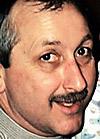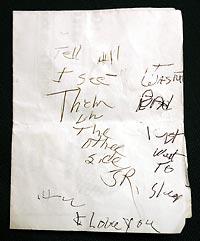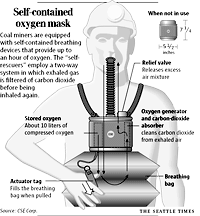A doomed miner's reassurance: "It wasn't bad just went to sleep"

TALLMANSVILLE, W.Va. — Some of the 12 coal miners who died in the Sago Mine disaster scrawled farewell notes assuring loved ones that their final hours trapped underground amid toxic gases were not spent in agony.
"Tell all I see them on the other side," read the note found with the body of mine foreman Martin Toler Jr., 51. "I love you It wasn't bad just went to sleep."
It was signed "JR."
Tom Toler, Martin's older brother who worked 30 years in the mine with him, said Thursday that the note was "written very lightly and very loosely" on the back of an insurance-application form his brother had in his pocket.
"I took it to mean that it was written in the final stages," the brother said. "I'd call it more or less scribbling."
The miners died after an explosion rocked the mine Monday morning. Eleven victims were discovered nearly 42 hours after the blast, at the deepest point of the mine. They were behind a curtainlike barrier set up to keep out carbon monoxide, a toxic byproduct of combustion that was present at deadly levels inside the shaft. The 12th victim was believed to have been killed by the blast.
Autopsies were under way Thursday, and officials would not comment on the cause of death or how long the men might have survived.
John Groves, whose brother Jerry was one of the victims, said he knew at least four notes were left behind. He said his family did not receive one.
No note was found on the body of machine operator Fred Ware Jr., 59, but daughter Peggy Cohen said the medical examiner told her and other relatives who went to identify bodies at a temporary morgue that some of the men wrote letters with a similar message.
"The notes said they weren't suffering, they were just going to sleep," said Cohen, who planned to retrieve her father's belongings to see if he had put such a note in his lunchbox.
Cohen said her father had the peaceful look of someone who died of carbon-monoxide poisoning, and the only mark on his body was a bruise on his chest.
"It comforts me to know he didn't suffer and he wasn't bruised or crushed," she said. "I didn't need a note. I think I needed to visualize and see him."
The sole survivor, Randal McCloy Jr., 26, remained in critical condition in a coma, struggling with the effects of oxygen deprivation to his vital organs. Doctors said he may have suffered brain damage.
Thursday afternoon, he was moved from a hospital in Morgantown to Allegheny General Hospital in Pittsburgh for hyperbaric oxygen treatment. The treatment helps get oxygen to the body's tissues, including the brain, and can help increase blood cells to fight infections or promote healing.
"Certainly Mr. McCloy is going to have a tough course," Dr. John Prescott said. "We just don't know at this point how things will turn out."
McCloy's wife, Anna, looking exhausted, attended a news conference at the hospital but did not answer questions.
"Just ask everybody to keep on praying," she said.
The miner's father, Randal McCloy Sr., said he believes "in his heart" that his son's colleagues, most in their 50s, decided during their last hours to share their dwindling supply of oxygen with his son because he was the youngest and had two young children.
"Those men were like brothers. They took care of each other," he said.
There was no immediate confirmation from officials that the men shared their oxygen.
Each miner had a breathing apparatus designed to provide up to an hour's worth of oxygen, but an expert said that time could conceivably be extended.
"A lot of it depends on the circumstances and how big you are and how much air you suck," said Terry Farley, an administrator with West Virginia's Office of Miners' Health Safety and Training.
Speaking of seeing his son on a hospital ventilator, the elder McCloy began crying. "I bent over and kissed his head. I told him that I loved him," he said.
The first of the funerals is scheduled Saturday.
Federal and state investigators were at the mine Thursday, seeking the cause of the explosion and a more detailed explanation for the miscommunication among rescuers that had relatives — and the rest of the world — believing for three hours that 12 of the miners had survived.
Coal-mine explosions are typically caused by buildup of naturally occurring methane or highly combustible coal dust in the air, but what triggered the Sago explosion remained unclear.
The Charleston (W.Va.) Gazette reported Thursday that a federal contractor that monitors thunderstorms detected three lightning strikes within five miles of the mine within a half-hour of Monday's explosion. The contractor, Vaisala, said two strikes, including one that was four to 10 times stronger than average, hit within 1 ½ miles of the mine.
The federal Mine Safety and Health Administration cited the Sago Mine for 208 violations of federal mine rules in 2005, a number an agency official said was higher than normal for a mine that size. Those violations included 18 orders shutting down parts of the mine until suspected violations were corrected, but none serious enough to close the entire operation.
Denver Anderson, who was in a group of miners just behind those who were trapped, had red splotches on his face from the rock that struck him in the blast. He said he didn't hear an explosion.
"It was just a big gush of air and heat and gravel, dirt, dust and smoke. I tried to turn around and throw my arm up to protect my face."
The explosion was West Virginia's deadliest coal-mining accident since 1968, when 78 men were killed in an explosion. Sago was the nation's worst coal-mining disaster since two explosions at a mine in Brookwood, Ala., killed 13 people in September 2001.
AP National Writer Deborah Hastings contributed to this report.

